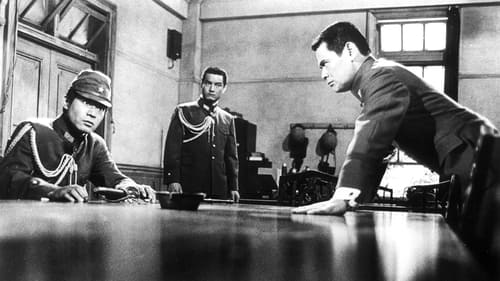
Minister of Public Welfare Keisuke Okade
Después de la detonación de las bombas atómicas de Hiroshima y Nagasaki, el ejército japonés y el gobierno se enfrentan por la demanda de los aliados de la rendición incondicional. El Ministro de Defensa Anami defiende el continuar luchando, hasta la muerte del último japonés si hace falta. El Emperador Hirohito se reune con sus ministros para solicitar la impensable rendición pacífica del Japón. Cuando el ejército planea un golpe para derrocar al gobierno civil del Emperador, Anani debe decidir entre sus deseos o su lealtad al Emperador.

Gonji
Farmer Abare Goemon is confronted by brigand-like samurai. He raises an army of farmers to fight them and does so brilliantly. When Lord Asakura sees the success Goemon has achieved, he attempts to recruit him to fight in a conflict between Asakura and another clan. Goemon refuses, and Lord Asakura sets out to destroy him.
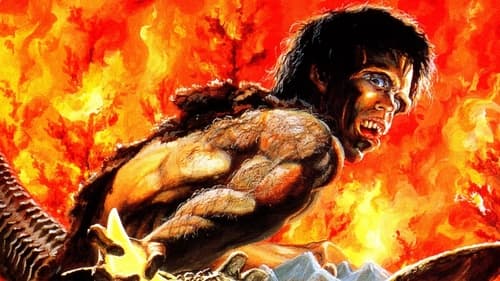
Mountain Soldier
Alemania, 1945. El corazón del monstruo de Frankenstein es conducido a Japón y, mientras es examinado, cae la bomba de Hiroshima. Quince años más tarde, un niño que ha brotado del corazón inmortal es atrapado, pero se comprueba que su crecimiento es imparable.
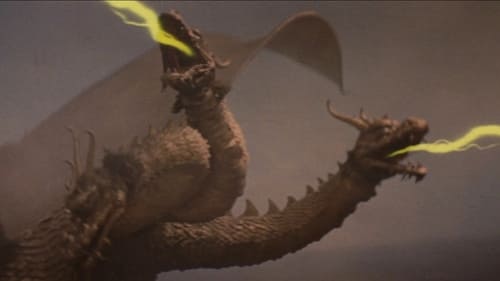
Chief of Infant Island
Tres monstruos (Mothra, Godzilla y Rodan) se alían para salvar al Japón (y al mundo entero, occidental y no occidental) de la destrucción a la que se ve amenazado por el terrible monstruo de tres cabezas Ghidorah.
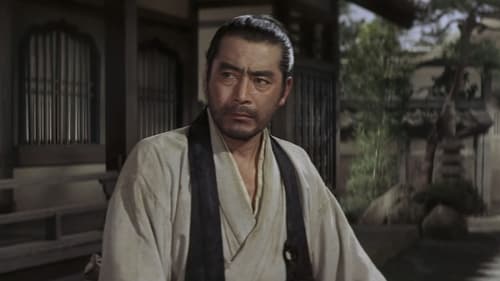
Set at the end of the Siege of Osaka this film follows the exploits of several members of the defeated Toyotomi clan as they cope with the post battle chaos and the persecution of the Shogun's army. Five samurai decide on different fates when it becomes clear that their side is being destroyed. One wants to attack the enemy head on in a final honorable death. Another decides to commit hari-kiri but wants to find a glorious view to do it. His close friend, the "coward", just wants to run and give up the life of a samurai. The final two set their own castle on fire to garner favors from the enemy and therefore avert their own death during the massacre of all defeated soldiers as
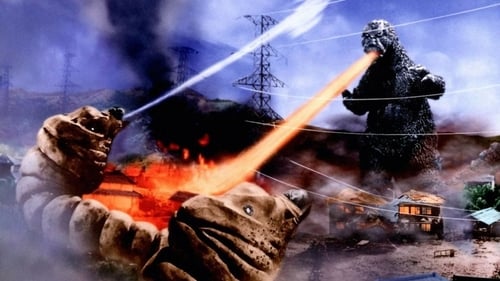
Infant Island chief
En una playa de Japón, unos pescadores descubren un huevo gigantesco. El huevo es vendido a Yamamura, un corrupto hombre de negocios que pretende incubarlo para convertir a la criatura contenida en él en la principal atracción de un parque temático de próxima inauguración. Yamamura no toma en serio a las dos diminutas gemelas protectoras de Mothra, las Aelinas, que lideran una iniciativa popular para que el huevo sea devuelto a su madre, que solo accederá a enfrentarse con Godzilla cuando este amenace la integridad de su criatura.
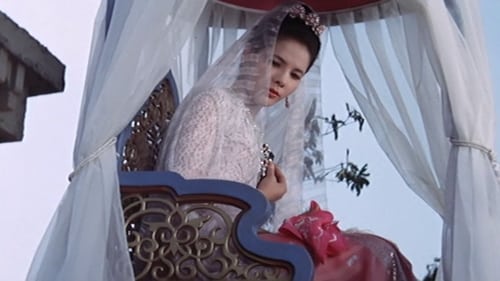
Captain of Thai ship
Sukezaemon, un pirata, naufraga en un rincón extraño del mundo. Con su compañero, un mago llamado Sennin, Sukezaemon se enreda en una conspiración del malvado primer ministro para la sucesión a la muerte del rey Raksha.

Film number six in the Desperado Outpost serie directed by Jun Fukuda
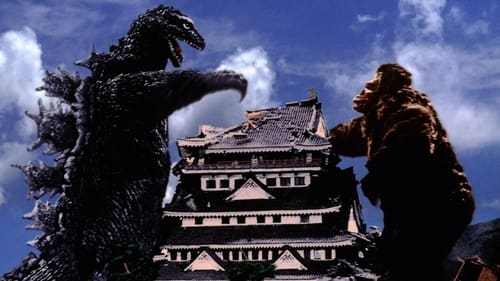
Farou Island Chief (uncredited)
La reedición más famosa de John Beck de la película japonesa original. Eric Carter se une al Dr. Johnson cuando Godzilla sale de la hibernación y una compañía farmacéutica japonesa busca publicidad con un monstruo propio. Se insertaron nuevas imágenes con actores estadounidenses junto con varias escenas del original japonés omitidas y reeditadas para alterar la estructura narrativa en torno a un informe de noticias que no estaba presente en el original. Gran parte de la banda sonora original fue reemplazada por música de archivo de la Biblioteca de la Universal con imágenes de The Mysterians también insertadas a lo largo de la película. Debido al acuerdo de licencia entre Toho y Universal, la edición estadounidense es la versión principal y más ampliamente disponible de la película.
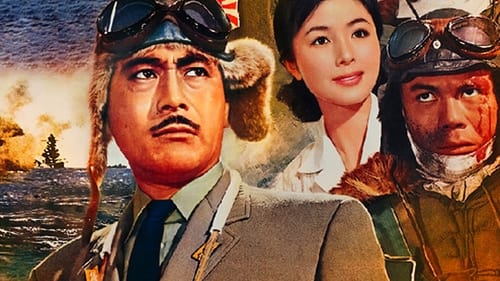
Destroyer Captain
El Teniente Coronel Senda se resiste a la idea de enviar a los pilotos de los cazas en misiones suicidas. El cree que lo que necesita el ejército japonés para volver a dominar la guerra es que la fuerza aérea reúna a los mejores pilotos en un solo escuadrón para realizar ataques quirúrgicos a los americanos. Despreciados por los Kamikazes, que llaman a los pilotos "no-suicidas" cobardes, la unidad se redime a sí misma cosechando victoria tras victoria. Pero el éxito lleva a los jefes militares a esperar demasiado de la unidad, lo que llevará a un desenlace fatal.
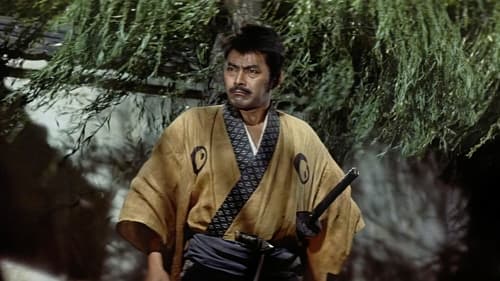
Esta impresionante historia épica ha sido a veces etiquetada como la versión japonesa de "Lo Que El Viento Se Llevó". Chusha Ichikawa personifica a un señor feudal poderoso y despiadado que lucha contra el virtuoso y joven noble, Yuzo Kayama. Ichikawa encuentra una victoria parcial cuando engaña a Kayama y lo convence de hacerse el Hara Kiri. La venganza será realizada por los cuarenta y siete samuráis de Kayama. Basada en una leyenda japonesa venerable, la historia de Chushingura ha sido filmada en varias ocasiones, pero sólo la versión de 1941 (47 Ronin) estuvo a la altura de la versión de 1962, del gran director Hiroshi Inagaki.
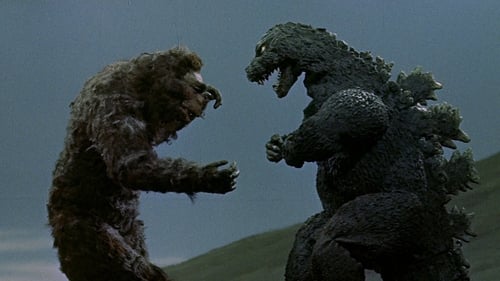
Farou Island Chief
Versión japonesa. Una expedición organizada por el director de publicidad de un compañía de farmacéuticos, viaja a la isla Farou para recoger bayas rojas y captura a King Kong para usarlo en una campaña publicitaria. Cuando Godzilla se libera de un iceberg se genra un frenesí mediático con el combate de lucha libre mas grande de la historia.
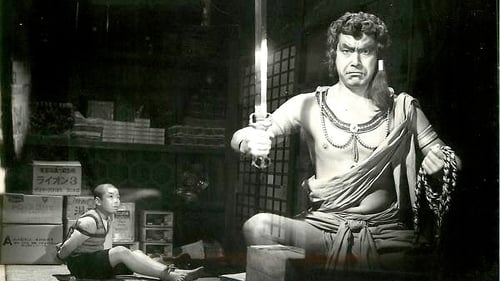
Gen is a lonely orphan boy. His sole sense of companionship comes from an imaginary friend, the god Prince Fudo-Myo. Prince Fudo-Myo comes to the boy's rescue in times of difficulty.

Four fishermen friends are caught up in a piracy plot.
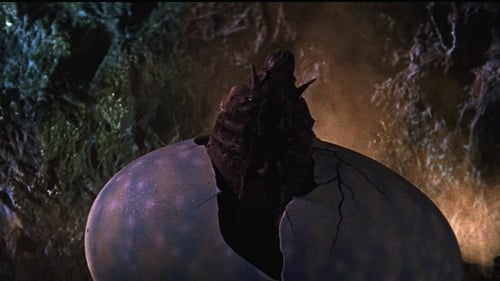
Ship Captain
Un par de gemelas de aspecto diminuto, habitantes de la isla de Beru, custodian celosamente a su deidad "Mothra". Desgraciadamente, son raptadas y trasladadas a Tokio por un expedicionario sin escrúpulos para ser explotadas artísticamente. Las gemelas utilizarán sus poderes místicos para revivir al gusano gigante a través de la telepatía. Éste a su vez se dirigirá a Tokio, con el firme propósito de recuperar a sus guardianas, ya convertido en polilla gigante y arrasándolo todo a su paso.

Gidayu Fujimoto
During the raging war between the Toyotomi and Tokugawa clans, the swordsman Mohei (whose family has been completely decimated) is recruited by Toyotomi to overcome the seat of power, Osaka Castle. Mohei's daredevil skills will be put to severe tests.

Mean Detective
Un bibliotecario es objeto de un experimento que sale mal y lo convierte en el "Vapor Humano". Utiliza su nuevo don para el robo de bancos y para ayudar a su novia bailarina. Buscado por la policía, y con varios crímenes a cuestas, el Vapor Humano es el enemigo público número 1 de Tokyo

A skilled country doctor's talents are such that he can even perform operations as difficult and novel as removing a patient's kidney for the first time in Japan. Unfortunately for him, however, his wife's addiction to gambling is of such a magnitude that he is down to selling his underwear to make money. The image sticks and he becomes known as the 'underwear doctor.' On the other hand, his successful surgery's patient is so grateful he himself wants to become a physician.

Tokisaburo
Chuji Kunisada vuelve a su pueblo natal y descubre que Jubei Matsui, un juez corrupto, ha sido el responsable de la destrucción de la familia Kunisada. Una nueva tragedia lleva a Chuji a unirse a una banda que vive en el bosque robando a los ricos para dárselo a los pobres, siempre con un ojo puesto en vengarse del Magistrado Matsui.

Kojin Station Chief
Japanese police detective Saburo Fujioka is suspected of corruption, demoted, and sent to the city of Kojin. Kojin is the scene of fierce fighting between rival gangs. Fujioka is assigned to investigate the death of the wife of gangster Tetsuo Maruyama of the Kozuka gang, probably at the hands of one of the Oka gang. During a gang gunfight, Maruyama is rescued by Detective Fujioka and the two become friends. But Maruyama insists on avenging his wife's murder, even if it means conflict with his new friend.
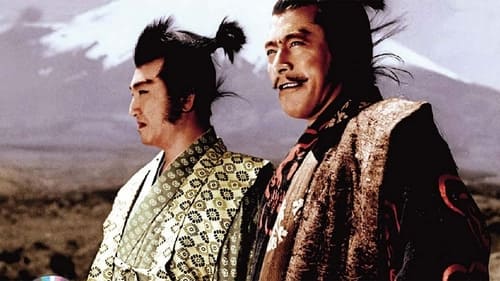
Lord Taro must deliver a money chest but is robbed by brigands led by Jibu. One of Jibu's men, Rokuro, steals the money from Jibu, but after meeting and befriending Taro, Rokuro decides to return the money to Taro. But Taro's unscrupulous brother Jiro falsely accuse Taro of the theft, and Taro reactively joins the outlaw band and encourages them to steal from the nobles and give to the poor.

King of Devils
The mythical adventures of the legendary Chinese trickster Monkey, who must outwit a variety of wily demons who stand in the way of him and his fellow Buddhist travelers. Though portrayed as a literal, if rather anthropomorphized, monkey in the original legends, this film substitutes the spindly comic actor Norihei Miki, sans makeup.

(uncredited)
Durante la Segunda Guerra Mundial (1939-1945), Kaji, un japonés pacifista, trata de librarse del servicio militar aceptando un trabajo como supervisor laboral en las minas de la Manchuria ocupada. Kaji se dedica a mejorar las pésimas condiciones de vida de los prisioneros, pero sus esfuerzos son despreciados por el jefe del campo de concentración. Un día, el odio acumulado estalla y tiene terribles consecuencias.
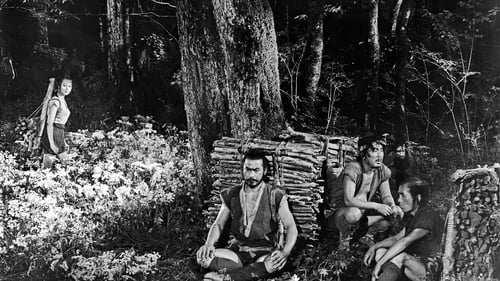
Akisuki soldier (uncredited)
Matashichi (Kamatari Fujiwara) y Tahei (Minoru Chiaki) son dos soldados huidos del conflicto bélico, que buscan el enriquecimiento. Cuando encuentran oro, se dan cuenta de que son vigilados por un silencioso y misterioso hombre, que finalmente resulta ser el célebre general Rokurota Makabe (Toshiro Mifune), quien utilizará a los dos soldados, ignorantes de la identidad de sus acompañantes, para transportar una gran cantidad de oro y liberar a la princesa Yukihime (Misa Uehara). Una divertida comedia de aventuras firmada por el gran Akira Kurosawa, que influyó notablemente en la construcción de personajes de la saga "Star Wars" de George Lucas.
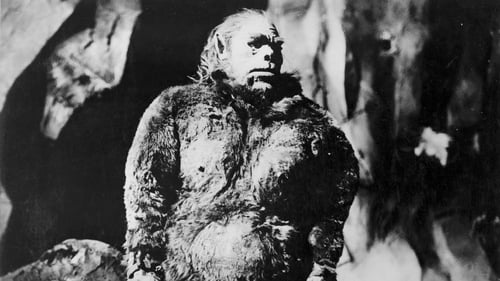
Circus Owner
An American scientist tells two colleagues about the finding of an abominable snowman living in the Japanese alps, where it is worshipped by a remote tribe as a god, and how it was discovered by modern man after it raided a ski-ers' shelter following an avalanche, killing all inside. This is an adaptation of the Japanese film Ju Jin Yuki Otoko with added American-made footage, narration and music track.

Hanaba
Historical drama about a sleepy-eyed ronin.

Hisako's Father
Ultra-perky model likes single freedom but feels ryosai kenbo ("good wife, wise mother") pressure, exemplified by her bored-to-tears sister.
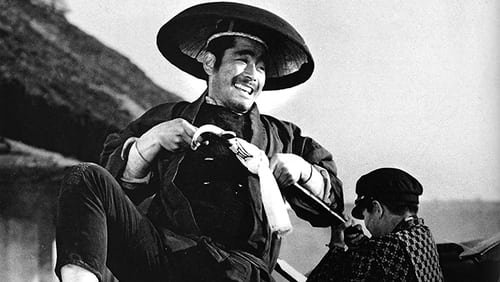
Matsugoro, un pobre conductor de carro en el Japón del periodo Meiji, devuelve a un niño perdido, Toshio, a su casa. Sus padres se muestran con él muy agradecidos. Tras la muerte del padre, la madre, Yoshiko, muy preocupada por su hijo, le pide a Matsugoro que le ayude a educarlo. Él acepta encantado. Con el paso del tiempo le coge mucho cariño, al niño y a la madre. Pero Toshio crece, y se marcha a estudiar a la universidad de Tokio, y Matsugoro se siente abandonado y triste...

May Kawaguchi is a famous Japanese fashion designer. Returning to Tokyo from her home in New York, she travels incognito with a tour group, in hopes of having a quiet vacation without being noticed. But she is spotted and the press has a field-day with the returning celebrity. Her hopes of rest shattered, she agrees to put on a large-scale fashion show.
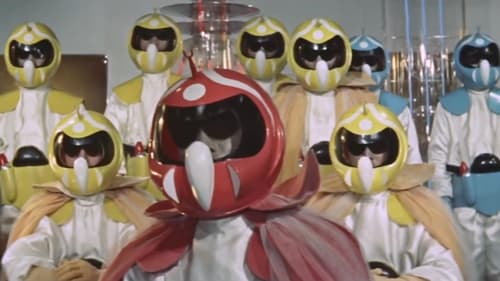
Cmdr. Sugimoto
Un grupo de extraterrestres llega a la Tierra y pide permiso para conseguir un lugar donde su gente pueda vivir. Pero pronto se descubre que realmente son invasores, creadores ademas de un gran robot que está destruyendo las ciudades terráqueas, por lo que las fuerzas militares humanas tratarán de detenerlo con cualquier arma disponible.

An Ishiro Honda film.

In the Tokugawa Era, the clan of Lord Yagyu has hidden away three scrolls containing clan secrets which, if revealed, would cause revolution and disaster for the clan. The information is divided among the three scrolls, all of which must be possessed for the secrets to be understood. When Princess Yuhime steals the scrolls, Tasaburo, a samurai with magical powers, and his brother Senshiro are sent to retrieve them.

Historical drama about a sleep-eyed ronin

Historical drama about a sleepy-eyed ronin.

Seiji (Eriko's father)

Official A
Lavish Japanese-Chinese coproduction based on an ancient Chinese legend about a man who falls in love with a snake goddess in human form.

Period romantic drama.

A musical starring 3 Japanese pop music and TV stars.

Iwataro
Forced on the road by yakuza obligations, a man sets out on a reckless journey to Tsumagoi. Movie posters for local cinemas were often displayed at sento (public baths) too. The handwritten text on the bottom here announces the film will play at Hassen for 3 days.
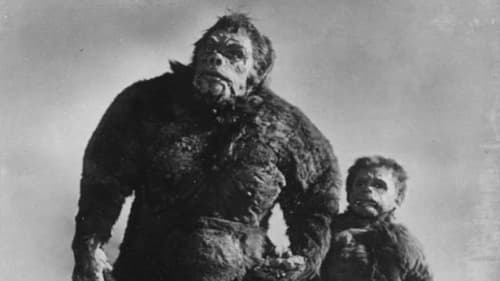
Oba
Three competing parties all race against time to track down an elusive creature known only as the Snowman.

Bonze
Japanese-Italian adaptation of Puccini's opera.

Hoshino
An Ishiro Honda film.

Jukichi
Lonely youth Shinji meets Hatsue, a pretty pearl diver, on the beach and the two fall in love. But Shinji has a rival for Hatsue's affections, Yasuo.
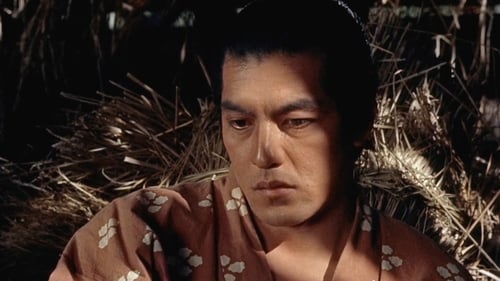
(uncredited)
Dos amigos dejan su pueblo para combatir con su ejército. Ambos, tras una derrota en el frente, se cobijan en la solitaria casa de Oko, una viuda que vive con su hija. Matachachi dejará que Oko le seduzca y, junto con ella y su hija se irá a Tokio, olvidando a su prometida...
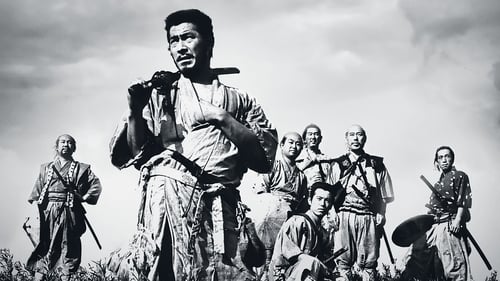
Mosuke
Una banda de forajidos atemorizan a los habitantes de un pequeño pueblo, saqueándolos periódicamente sin piedad. Para repeler estos ataques, los aldeanos deciden contratar a mercenarios. Finalmente, consiguen los servicios de 7 guerreros, 7 samurais dispuestos a defenderlos a cambio, tan solo, de cobijo y comida.
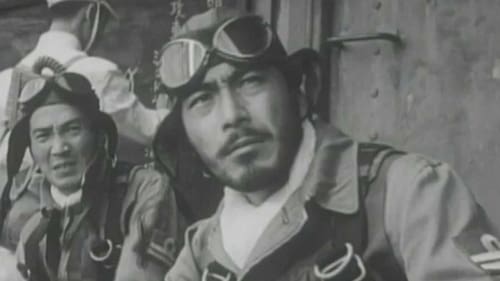
(uncredited)
Admiral Isoroku Yamamoto, a brilliant tactician, is a loyal subject of the emperor, despite his grave misgivings about leading Japan's navy into war with the United States. He opposes the attack on Pearl Harbor, but, overruled, he leads his forces to the best of his ability.

Tatsuma Hayase
Period film about a feudal era judge living in Edo

Jirocho the gambler hits the road.

Sarumaru
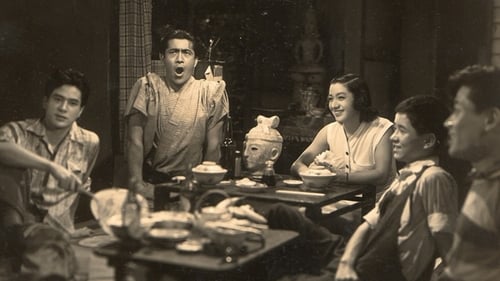
Following the Second World War, the lives of various people in a poverty-stricken area of Tokyo are entertwined. Pachinko parlor girls, shoeshine boys, a maker of costume jewelry, and a streetcorner artist all struggle to make their livings and to find happiness in difficult surroundings.

Horibe Yasubee
Jidai-geki by Kiyoshi Saeki
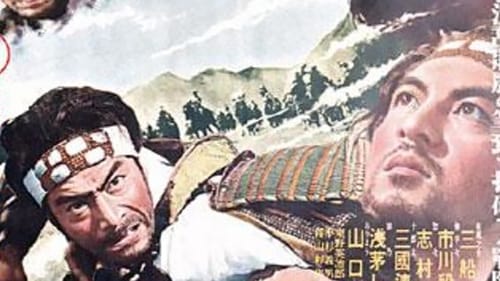
Soldiers Hayate and Yaheiji secretly escape from their besieged castle. Hayate has left behind his lover, Kano. On his way, Hayate is wounded and cared for by O’Ryo, who falls in love with him. But when Hayate accidentally kills her caretaker, he flees, with O’Ryo in pursuit. Subsequently, Hayate's comrade Yaheiji falls in love with Oryo. Kano, the lover left behind by Hayate, believes him dead, and becomes involved with another soldier, Jurota. When Jurota defects to the opposing army, he takes Kano with him. A double set of love triangles has developed, wherein each man and each woman loves one and is loved by another. Finally only combat and self-sacrifice can untangle the weave.
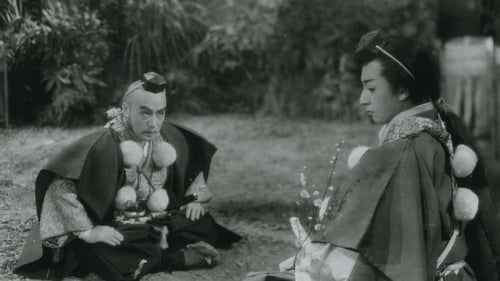
Suruga
Japón medieval. Un samurai huye de su hermano. Tanto él como sus guardaespaldas tienen que disfrazarse de sacerdotes para atravesar un bosque y eludir a los guardias de la frontera.

Nonaka
When a group of young geologists declares a mountainside marked for residential development unstable, they are met with scorn on two fronts. On one end, they must contend with the local villagers who balk at the prospect of relocation; on the other, they face the ambitions of the headstrong lumber baron, whose actions will only further destabilize the land. Their pleas for reason ignored, the scientists can do little but observe as nature runs its inevitable course.

This early gem starring the great Mifune Toshiro tells the tale of Katakana Yonetaro aka "The Shark," a rough-and-tumble horse trader in Japan's rugged northernmost territory of Hokkaddo.. ...
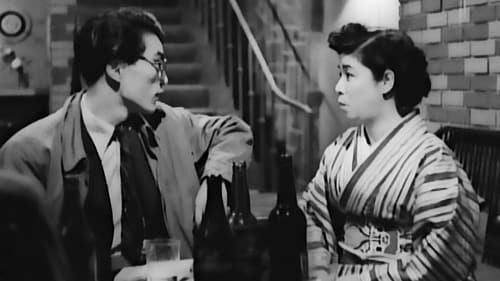
Eijirô Kasai
A luckless geisha struggles to make a living for herself and her young son.

A Japanese adaptation of Guy de Maupassant's short story Boule de Suif, directed by Kimura Keigo

Wataru Naohiko who has the prosecutor general as his father became a young composer and its symphony "saint" invoked the world echoed. But his disciple Uchiyama and his best friend prosecutor Daisuke Toki accused his music as a sesame of pause-only technique, not a truly heart-hungry art.

Director Hiroshi Inagaki's early version of the life and death of famed swordsman Sasaki Kojiro. Otani Tomoemon gives a brilliant performance as Sasaki Kojiro, who rises from humble beginnings to national fame, and a young Toshiro Mifune appears as the legendary master swordsman Miyamoto Musashi for the first time and essentially sets the standard for future portrayals.This masterpiece is based on the original story as written by noted author Murakami Genzo and is far superior to any other versions. Following Kojiro from his earliest days through his fateful meeting with Musashi, this movie is filled with exciting and dramatic moments culminating in the best version of the final duel ever seen on film.

Lord of the cabaret
Woman melodrama by Shiro Toyoda

In a village subsisting on it herring fishery, a one-eyed criminal named Jakoman terrorizes the inhabitants. One of them, the son of the head of one of the fish companies by the name of Tetsu, decides to overthrow Jakoman and his cohorts.

Directed by Eisuke Takizawa
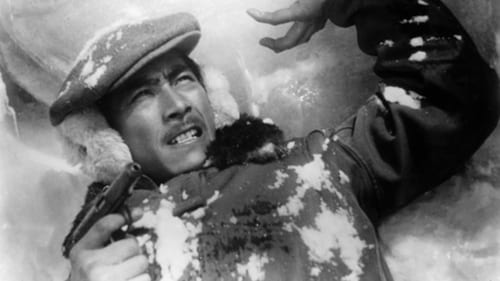
Takasugi
Three bank robbers, Eijima, Nojiri, and Takasugi, flee the police and escape into the mountains. At an inn high in the Japanese Alps, Eijima and Nojiri encounter a young woman and her father, as well as Honda, a mountaineer. The inn folk do not realize their guests are wanted criminals and the visitors are treated with great kindness. Honda volunteers to lead them over the mountains, but Eijima's paranoia endangers all of them as they make the perilous trip.

After learning that he has accidentally killed a man in a fight, Unokichi must look after the man's pregnant widow.
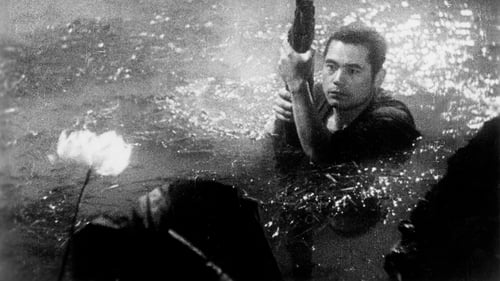
Master Saburo Kodama
1883, a principios de la era Meijii. Sanshiro Sugata es discípulo de Shogoro Yano, un maestro de judo. A lo largo de su aprendizaje y de sus combates aprenderá los principios y valores primordiales de una filosofía que le permitira guiar sus pasos en la vida.

The Opium War is a 1943 black-and-white Japanese film directed by Masahiro Makino. "Ahen senso" in Japan refers to the First Opium War. The story of the film concerns this war.

War-time jidaigeki by Eisuke Takizawa. Didn't find anything about it online, but Takizawa was a well-regarded director in his time. Akira Kurosawa worked as A.D. on several of his films.

1942 adaptation of Izumi Kyoka's novel.

Maple Leaf Man
What is marriage? Young couple in match-making wanted to know before they decide. They visited married couples of sisters and brothers. Love comedy in 1942.

A 1942 Jidaigeki by the veteran jidaigeki filmmaker Kunio Watanabe about the legendary warrior Musashibo Benkei
with Hideko Takamine portraying Minamoto no Yoshitsune (who is, of course, a man).
The film climaxes in the famous encounter/fight btw Benkei and Yoshitsune at the Gojo Bridge.

Kansuke Yamamoto
This epic depicts the battle between Uesugi Kenshin and Takeda Shingen. The focus of the story is the struggle by the unit leader in charge of the main supply wagons and the supply troops to transport materiel to the Uesugi army. To this are added episodes involving an itinerant woman.
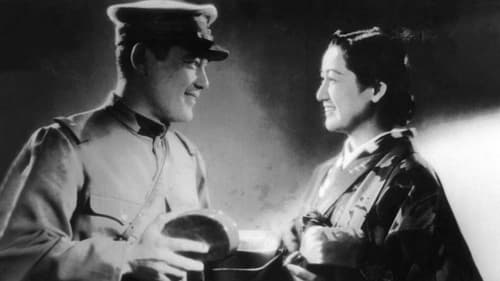
In this semi-documentary, an older locomotive driver is tasked with training younger ones and is currently training two in particular. The old man is finding the task overwhelming as it is hard work with practical lessons and classroom components. His wife has died, but he has three daughters with the oldest taking care of her younger siblings.

Ine Onoda, the eldest daughter of a poor family of farmers, raises a colt from birth and comes to love the horse dearly. When the horse is grown, the government orders it auctioned and sold to the army. Ine struggles to prevent the sale.

Ichiro Takashima, Hideko's father
Hideko, a young Baseball fan, determined to cheer for her favourite baseball team by creating a new song for them.

Song of the White Orchid was a co-production of Toho and Mantetsu, the railway that served the colonial region of Manchuria, and the first film in the Kazuo Hasegawa/Shirley Yamaguchi (Ri Koran) “Continental Trilogy.” Handsome Hasegawa (representing Japan) runs up against an impertinent Yamaguchi (representing the continent); not surprisingly, in the course of the film the woman comes around and realizes the benevolent intentions of the Japanese. In Song of the White Orchid Yamaguchi leaves Hasegawa, who plays an expatriate working for the railway, because of a misunderstanding. She joins a communist guerilla group plotting to blow up the Manchurian railway. Learning of the subterfuge that led to the misunderstanding, she renews her faith in Hasegawa—and by extension Japan—and tries to undermine the plot.

This film attempts to reconstruct the tension of the Battle of Shanghai through an episode in an understated way, introducting its story in a documentary mode. In the film story, Japan's marine regiment protects Japanese residents and Chinese refugees-women and young children-from rampant street fighting, Shanhai Rikusentai unsparingly uses its first eight minutes for an official-mannered self-justification of the war. From the viewpoint of explaining Japan's military operation,the narration refers to the city s spatial division in sync with maps on screen.

Japanese adaptation of LES MISERABLES. The last film of director Itami took inspiration from Les Miserables. Transpiring during the Southwestern War of 1877 in Japan, which was the last civil war in the country, a criminal escapes prison only to be found by a monk. The criminal decides to turn a new leaf based on their conversation and goes on to become a town's mayor. He hears news of a mistaken arrest and identity. The revelation of truth is the start of a series of miseries.

Hikoroku Laughs a lot

Ino tries to control Mon’s every move, but she becomes a fallen woman, having an affair with a student, Obata whereas her sister San remains a “good girl.” The mother is very supportive of her daughters, but, the father, Akaza, who is the stonecutter foreman on the damn, lacks control of his family.

Toun
This film is based on a real Meiji era performer -- and tells of Tochuken's partnership with his wife (played by Chikako Hosokawa) who played shamisen for his songs/recitations), his affair with a geisha (Sachiko Chiba), and the deterioration of his partnership and marriage.

Aikawa (a poet)
Adaptation of Fumiko Hayashi's novel.

Kimpei

























































